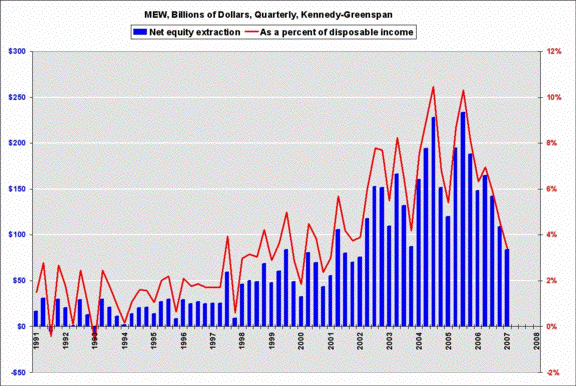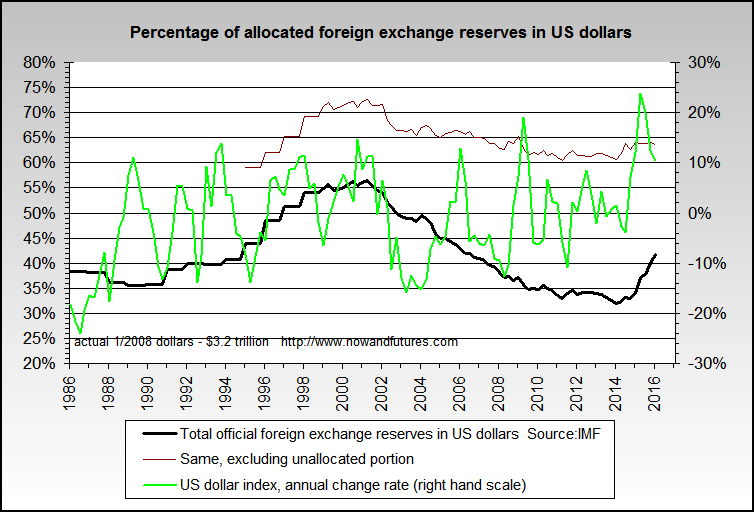 |
June 7, 2007 (iTulip)
Don't forget, it started with real estate
An old expression reappeared during the 1990s stock market bubble to explain how Internet and telecommunications companies with no apparent prospects, and run by children, were able to go public and then see their stock prices shoot up: "If the wind blows hard enough, even turkeys fly." A gale force wind of money has circulated the planet for the past few years, putting everything from large public companies to large empty office buildings to flight. As inflation increases globally, the Wall Street backed American Association for the Prevention of Cruelty to Flying Turkeys has been lobbying the Fed for if not a rate cut at least forbearance on hikes. But recently the bond market started telling the Fed that time is running out, and stock market investors are taking notice.
We developed the diagram to the left for readers who desire a concise depiction of the economic order of things in our world, and where today's turkeys fit into it. You see the US "platform economy," as some of its apologists creatively label it, fulfilling its role as manufacturer of financial assets, in both paper and digital form, and as grand maker of clever ideas. These are shipped to Europe and Asia where, presumably, they don't have enough of either, where they are turned into stuff. In return, Asians and Europeans ship their hard earned savings, of which they are told they have too much–especially in the eyes of Congress–and cheap goods manufactured in Asia by workers who have had for decades less pricing power in their labor markets than a sea shell necklace vendor at a seaside tourist trap. The oil producing countries send not only oil but–pennies from heaven–the money to buy it with. When it comes to using one's perch in the global geopolitical catbird seat to extract tribute at the height of empire, it just doesn't get any better than this.
Problem is, workers in Asia are gradually gaining pricing power as the global economy surges for perfectly legitimate reasons, along side less legit ones such as crazed speculation in just about everything, resulting in turkey levitation. Future wage inflation is virtually guaranteed, for example, in China where the state in spite of a monopoly on force that accrues to dictatorship must constantly weigh the political consequences of heavy handed subjugation of angry rural workers–the Chinese equivalent of the cheap labor supply that the US government has to pretend to not want crossing its southern border–versus the negative economic consequences of unionization.
But the unionization movement in China is picking up speed, and not with little tail wind from government. Unions not only help the CCP keep out foreign companies it doesn't want there but also provides a welcome safety value for an increasingly cranky proletariat and demands for democratic reforms. Readers may recall that the major long term impact on wages in the US from draconian Fed tightening under Volcker in the 1980s was the virtual elimination of unions as force of pricing power in US labor markets. While still nascent, unionization along with limits to the rate of increase in the skilled labor pool are starting a wave of wage inflation in Asia that is closing the loop that starts with the dollar printing press and ends with rising prices of fake Fendi hand bags at Walmart. As we have warned for years, once traded-goods prices start to rise, the low US CPI inflation hoax will be at an end.
Alas, the Fed is out of time stalling on a response to the inflation threat, and the dissonance between the reality on the street and Fed jaw boning is starting to develop a Twilight Zone quality. Monday Professor Ben said the economy will pick up, presumably laying the groundwork for future rate hikes. The Whitehouse days later announced that the economy is headed into a slump, lowering its GDP forecast for the year from 2.9 to 2.3 percent. We suggest readers skim both stories while imagining them read by Rod Serling. The bond market, smelling an inflation rat, started to push up long bond yields. As mortgage rates rise in tow, the housing market, already on the ropes, may fulfill the Whitehouse wish. But the damage won't be so bad, according to the National Association of Liars: "Home sales will probably fluctuate in a narrow range in the short run, but gradually trend upward with improving activity by the end of the year," said Lawrence Yun, the group's latest economist-in-the-barrel.
We are sticking to our October 2006 prediction for a housing bubble deflation led US recession by Q4 of this year. Nonetheless representatives of the real estate industry will repeat versions of the "it's coming back" story, reminiscent of claims by Abby Joseph Cohen during the year 2000 stock market correction, even as stock markets price in a late 2007 recession. When the US Economy Quartette begins to play “Nearer my God to Thee,” expect the RE guys to talk louder and louder, and continue to do so until all you hear is "blub, blub, blub."
Getting back to our diagram for a moment, the making stuff, saving, and lending money trade block is not motivated to lend much to the borrowing money and consuming stuff trade block–and we use the term "trade block" to highlight the absurdity of the notion of a trade group composed of a single nation that offers the world as its primary contribution to trade a willingness to go into debt to maintain a lifestyle to which it has become accustomed–if its spendthrift people and government were to reduce their consuming, such as they may during a recession, or cannot avoid so doing except by going even further into debt. Thus, as predicted by Ka-Poom Theory, recession in the US in the absence of recession elsewhere in the world will tend to cause US inflation to rise, the dollar to decline, bond yields to rise, the US economy to slow further, and so on. Smart folks over at SmartMoney.com disagree, and we recommend frequent visits to their Yield Curve page and commentary. They view rising bond yields as a symptom of lower bond demand relative to riskier assets. But then why are stocks and commodities tanking?
In the old days, before massive US trade deficits, the Fed could count on US a slowing economy to lower inflation. Markets may be at last catching on: it ain't 1980 anymore. If Volcker were to try today what he did in 1980, inflation would not fall, it would rise. Also, while Congress has never been a group to risk the unpopularity of the economic high road, this Congress, in either Republican or Democratic flavor, has proven itself completely unwilling to go for an hour without spending or borrowing more money. There is a direct tie between turkeys in Congress and flying turkeys that will continue to play out in the markets over the summer.
 |
Readers sent us piles of great stories the past few days (keep 'em coming!). The first we mention delivers the shocking news–take a seat if you're standing–that during the speculative home flipping frenzy at the top of the the housing bubble... fraud happened! Not only in real life, but even on TV!
'Flip This House' Star Accused of Fraud
June 4, 2007 (DOUG GROSS - AP)
On an episode of A&E's popular reality series "Flip This House," Atlanta businessman Sam Leccima sits in front of a run-down house and calls buying and selling real estate his passion.
Now authorities and legal filings claim that Leccima's true passion was a series of scams that included faking the home renovations shown on the cable TV show and claiming to have sold houses he never owned.
"This is, indeed, a con artist," said Sonya McGee, an Atlanta pharmaceutical representative who says Leccima took $4,000 from her in an investment scheme.
McGee and others say Leccima's episodes of "Flip This House," A&E's most popular show, were elaborate hoaxes. His friends and family were presented as potential homebuyers and "sold" signs were slapped in front of unsold houses. They say the home repairs -- the lynchpin of the show -- were actually quick or temporary patch jobs designed to look good on camera.
Just as the slapped-on paint used to lure suckers into buying over-priced homes is starting to peel off houses purchased two years ago, the facade of free markets is coming off the mortgage industry. Long supported by government tax policies that cost taxpayers billions, and legal loopholes that an overweight felon can jump through, pity the poor hedge fund that bet heavily on mortgage default doom.June 4, 2007 (DOUG GROSS - AP)
On an episode of A&E's popular reality series "Flip This House," Atlanta businessman Sam Leccima sits in front of a run-down house and calls buying and selling real estate his passion.
Now authorities and legal filings claim that Leccima's true passion was a series of scams that included faking the home renovations shown on the cable TV show and claiming to have sold houses he never owned.
"This is, indeed, a con artist," said Sonya McGee, an Atlanta pharmaceutical representative who says Leccima took $4,000 from her in an investment scheme.
McGee and others say Leccima's episodes of "Flip This House," A&E's most popular show, were elaborate hoaxes. His friends and family were presented as potential homebuyers and "sold" signs were slapped in front of unsold houses. They say the home repairs -- the lynchpin of the show -- were actually quick or temporary patch jobs designed to look good on camera.
Subprime Fiasco Exposes Manipulation by Mortgage Brokerages
June 1, 2007 (Seth Lubove and Daniel Taub - Bloomberg)
Under U.S. law, investors who buy mortgages or securities backed by them are typically not susceptible to lawsuits alleging fraud on the part of brokers.
Such protection partly explains why the U.S. mortgage-backed- securities market has ballooned. The market more than tripled since 2000; $2.4 trillion of MBSs were issued last year, according to the Securities Industry and Financial Markets Association in New York. Last year was the first time more than half of the securities issued were backed by subprime and other nonconforming loans, according to the trade group.
Over on iTulip Select, we're working up an investment thesis predicated on the idea that there will develop a new government-protected, government-enabled asset bubble, since the housing bubble is winding down. Gotta have one, just like we had to have the housing bubble after the 1990s stock market bubble popped. The alternative is too dark to contemplate. We're just not that pessimistic.June 1, 2007 (Seth Lubove and Daniel Taub - Bloomberg)
Under U.S. law, investors who buy mortgages or securities backed by them are typically not susceptible to lawsuits alleging fraud on the part of brokers.
Such protection partly explains why the U.S. mortgage-backed- securities market has ballooned. The market more than tripled since 2000; $2.4 trillion of MBSs were issued last year, according to the Securities Industry and Financial Markets Association in New York. Last year was the first time more than half of the securities issued were backed by subprime and other nonconforming loans, according to the trade group.
Hedge Funds to Deliver Eviction Notices
June 1, 2007 (Portfolio.com)
According to a report in the Financial Times, a group of 25 hedge funds has asked the International Swaps and Derivatives Association to tell the banks to stop helping the poorest homeowners avoid foreclosure.
Of course, the hedge funds don't quite put it in those terms. Instead, they suggest that the banks are engaging in "market manipulation."
Some hedge funds invest in derivatives contracts that pay investors when bonds backed by subprime mortgage loans take a hit. Since the $1.2 trillion subprime mortgage bond market has had a rough ride of late, the hedge funds that invested in these derivatives have profited handsomely. The more defaults, the better.
The funds' beef is that the same banks that sell these derivatives can decide to give the homeowners a break on their monthly payments instead of defaulting. The funds say the banks can avoid paying out on the derivatives contracts by lending a hand to the borrowers.
One hedge fund representative told the FT they aren't out to evict people from their homes. They just want to make sure the banks are operating above board.
Had they read our interview with Michael Hudson earlier this year they'd have known what was in store and saved a bundle. He predicted banks were going to extend and restructure mortgages versus take back properties, and so they have. Here's why it works.June 1, 2007 (Portfolio.com)
According to a report in the Financial Times, a group of 25 hedge funds has asked the International Swaps and Derivatives Association to tell the banks to stop helping the poorest homeowners avoid foreclosure.
Of course, the hedge funds don't quite put it in those terms. Instead, they suggest that the banks are engaging in "market manipulation."
Some hedge funds invest in derivatives contracts that pay investors when bonds backed by subprime mortgage loans take a hit. Since the $1.2 trillion subprime mortgage bond market has had a rough ride of late, the hedge funds that invested in these derivatives have profited handsomely. The more defaults, the better.
The funds' beef is that the same banks that sell these derivatives can decide to give the homeowners a break on their monthly payments instead of defaulting. The funds say the banks can avoid paying out on the derivatives contracts by lending a hand to the borrowers.
One hedge fund representative told the FT they aren't out to evict people from their homes. They just want to make sure the banks are operating above board.
Say you have a 30 year mortgage at 7% on $250,000, where rates will be soon enough. That loan will net the bank about $100,000 in interest over 30 years. What if you can't pay the loan now but the bank is convinced you can pay it back later? The bank agrees to add past due monthly payments onto the end of the loan for a while until you can pay, while also restructuring the rest of the loan. Let's say the net result is that the bank extends the $250,000 loan from 30 years to 40 years, and in the process knocks the monthly payment down to $1,553. Good deal for the borrower, right?
Through the magic of compound interest, at 7% at the end of 40 years the bank nets about $250,000 in interest instead of a mere $100,000 if the loan had been paid off in 30 years. Keep in mind that the borrower didn't get another dime. The borrower will in total pay as much in interest as the original value of the house when it was purchased, a total of nearly $500,000. Beeeeeautiful! If you're the bank.
Don't be surprised to see all the bears that capitulated over the last few weeks come running back over to the bear side. A few may even take the inflation side of the bear case, as we have for years. Count Bill Gross as among the first. Now he's calling for a bear market in bonds.
Oh, speaking of Volcker, is it time to bring back usury laws? They were abolished in the early 1980s to make way for Fed rate hikes. Below are for-real interest rates on loans from cashcallcom. Who needs loan sharks?
|
iTulip Select: The Investment Thesis for the Next Cycle.
__________________________________________________
For a book that explains iTulip concepts in simple terms see americasbubbleeconomy
For macro-economic and geopolitical currency ETF advisory services see Crooks on Currencies
For macro-economic and geopolitical currency options advisory services see Crooks Currency Options
For the safest, lowest cost way to buy and trade gold, see The Bullionvault
To receive the iTulip Newsletter or iTulip Alerts, Join our FREE Email Mailing List
Copyright © iTulip, Inc. 1998 - 2007 All Rights Reserved
All information provided "as is" for informational purposes only, not intended for trading purposes or advice. Nothing appearing on this website should be considered a recommendation to buy or to sell any security or related financial instrument. iTulip, Inc. is not liable for any informational errors, incompleteness, or delays, or for any actions taken in reliance on information contained herein. Full Disclaimer





Comment